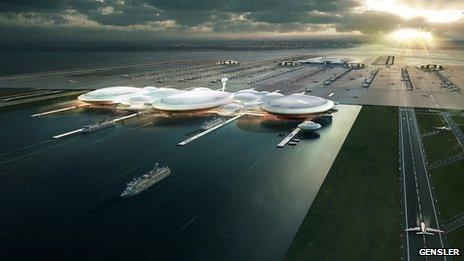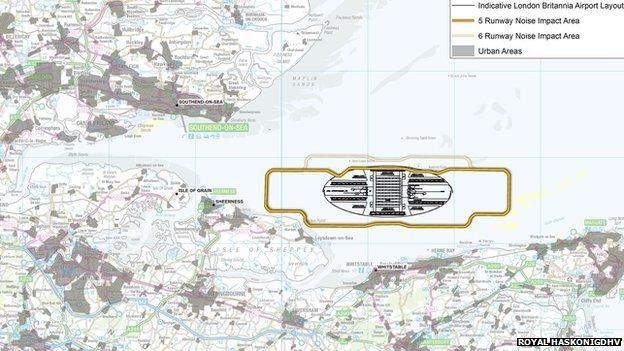'Boris Island' London Airport designs unveiled
- Published

The consortium behind the airport said it could be built in seven years
Designs and details of how a Thames estuary airport would work have been unveiled.
London Britannia Airport, the proposed six-runway airport formerly known as Boris Island, would cost £47.3bn.
The consortium behind the scheme claims it could be built within seven years.
The Davies airport commission is currently reviewing potential sites for more airport capacity in the South East, including additional runways at Gatwick and Heathrow.
Testrad, external (Thames Estuary Research and Development) said the island scheme avoided the problems of other land-based airport developments.
'Bedevilled millions'
A spokeswoman said those included demolition of houses, removal of green field sites, bird strikes, acquisition of private land and demolition of industrial infrastructure.
She said a key point was "separating people from planes" by giving passengers the benefit of air travel but without noise because all aircraft landing and departures would be over the estuary rather than residential areas.

Testrad said opportunities for housing, employment and the economy were huge but Heathrow would probably have to close
"Most importantly it avoids flying over densely populated areas of London and the South East, removing completely the noise contours and impact which have bedevilled millions of people throughout and around London over the past 40 years," she said.
The consortium has said that although Heathrow would probably have to close, the opportunities for new housing, employment and economic regeneration were huge.
It said £47bn would be recouped from the real estate value and closure of Heathrow.
'24-hour flights'
Testrad said there could be a new London borough in the Heathrow area with 300,000 new houses and about 200,000 new jobs, along with economic regeneration of east London, Kent and Essex.
It said the runway configuration would allow three or four aircraft to operate at the same time, 24-hours-a-day in all weather conditions.
Logistics operations would be at Sheerness and the A249 would be upgraded to provide a new M2 connection.
Passenger check-in and arrival terminals would be at Ebbsfleet, next to the high speed rail link, and at St Pancras International in London.
There would be a long-term option of a check-in at the Royal Docks, external in east London and central London.
Testrad said check-in terminals would be linked to the airport by high speed rail tunnels and the estuary airport would be "car free with no private car access".
The London Britannia Airport is on the same site as the former "Boris Island" plan but the project was a new "iteration" of research conducted years ago, the spokeswoman added.
Testrad is the original agency formed by London Mayor Boris Johnson to look at the estuary airport option, but it now involves more partners including architecture, marine, environment, transport and aviation experts, she said.
Medway, Kent and Southend councils, the RSPB and environmental campaigners have opposed the estuary airport plans.

Testrad said all aircraft landing and departures would be over the estuary
- Published8 August 2013
- Published7 August 2013
- Published13 June 2013
- Published29 May 2013